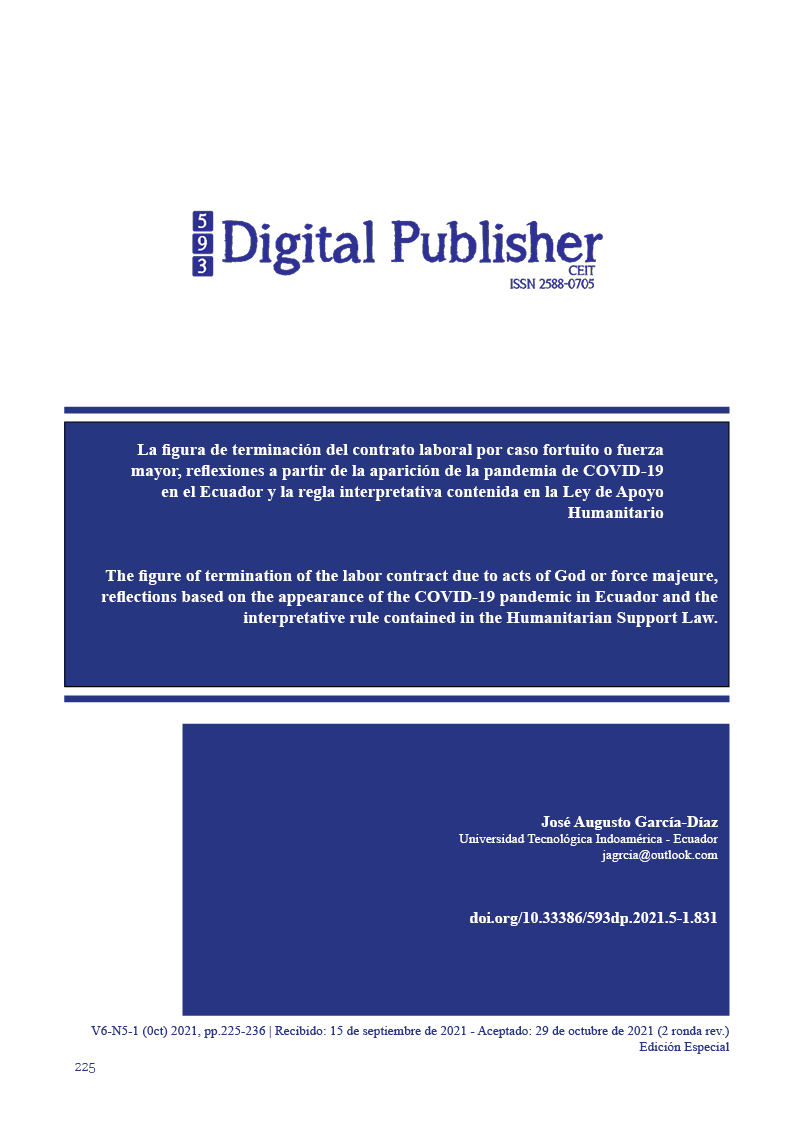The figure of termination of the labor contract due to acts of God or force majeure, reflections based on the appearance of the COVID-19 pandemic in Ecuador and the interpretative rule contained in the Humanitarian Support Law
Main Article Content
Abstract
This paper is an examination of the components that encompass the concept of fortuitous event or force majeure from the doctrinal, legal and jurisprudential point of view, as well as its origin and application in the labor field as a form of termination of labor relations with the appearance of Covid-19 in the country. First of all, a conception of the fortuitous event or force majeure will be sketched, taking into account its main characteristics. Subsequently, through comparative law and national jurisprudence, we will determine the essential requirements of this figure in order to terminate the labor relationship in a legal and timely manner, to finally land on the application of the interpretative rule set forth in the Organic Law of Humanitarian Support and how this will generate legal contradictions that will arise as a result of the labor lawsuits filed at the present time.
Downloads
Article Details

This work is licensed under a Creative Commons Attribution-NonCommercial-ShareAlike 4.0 International License.
1. Derechos de autor
Las obras que se publican en 593 Digital Publisher CEIT están sujetas a los siguientes términos:
1.1. 593 Digital Publisher CEIT, conserva los derechos patrimoniales (copyright) de las obras publicadas, favorece y permite la reutilización de las mismas bajo la licencia Licencia Creative Commons 4.0 de Reconocimiento-NoComercial-CompartirIgual 4.0, por lo cual se pueden copiar, usar, difundir, transmitir y exponer públicamente, siempre que:
1.1.a. Se cite la autoría y fuente original de su publicación (revista, editorial, URL).
1.1.b. No se usen para fines comerciales u onerosos.
1.1.c. Se mencione la existencia y especificaciones de esta licencia de uso.
References
Oramas Velasco, L. (2020). Caso fortuito y fuerza mayor en tiempos de pandemia. Iuris Dictio, 195-205.
Velasco, L. F. (2020). Caso Fortuito y Fuerza Mayor en tiempos de pandemia . Iuris Dictio No. 26, 195.
Caso 16-2006 (Ex Corte Suprema de Justicia. Tercera Sala de lo Civil y Mercantil. Gaceta Judicial 2007, Serie XVIII).
Tamayo, F. J. (1982). Las causales de exoneración en la responsabilidad civil. Revista de la Universidad Pontificia Bolivariana.
Picazo, L. D. (2008). Fundamentos del Derecho Civil Patrimonial II. Las Relaciones Obligatorias. Madrid: Thomson Civitas.
Brantt, M. G. (2009). Las exigencias de exterioridad en el caso fortuito: su construcción a partir de la distribución de los riesgos del contrato. Revista de Derecho de la Pontificia Universidad Católica de Valparaíso No. 32, 43.
Juicio No. 1948-2015, Juicio No. 1948-2015 (Corte Nacional de Justicia 22 de junio de 2017).
Juicio No. 282-2007 (Ex Corte Suprema de Justicia 11 de septiembre de 2007).
Castro, J. L. (2015). Casso Fortuito o fuerza mayor como causal de término de la relación laboral. Requisitos del caso fortuito ¿Se confunden con la inimputabilidad del empleador? Revista Chilena de Derecho del Trabajo y de la Seguridad Social. Talca No.11, 15.
Causa No. 947/2009, Sala Cuarta de la Corte Suprema de Chile (2009).
Diario El Comercio. (13 de junio de 2020). Uso injustificado de la causal de fuerza mayor genera indemnizaciones por despido intempestivo. Obtenido de https://www.elcomercio.com/actualidad/negocios/causal-fuerza-mayor-indemnizaciones-despido.html


